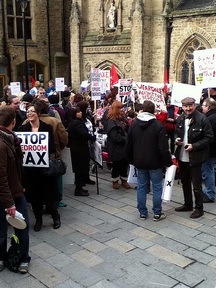Some care providers pulling out all the stops to help vulnerable tenants fight the bedroom tax
The controversial bedroom tax came into force a year ago, and thousands marked the event last week by holding a day of action.

The policy has caused dissent all over the UK, with protesters claiming it is unfair and penalising people who are already struggling financially.
The Labour Party has heavily criticised the tax, with Shadow Secretary of State for Work and Pensions, Rachel Reeves, calling it “a disaster from start to finish”.
Even the Liberal Democrats have voiced their opposition to the bedroom tax, after a committee of MPs said it caused “severe hardship and distress” for disabled people.
The Work and Pensions Select Committee found the tax was to blame for a rising homelessness and that nearly two thirds of people affected by it are disabled.
The committee recommends exemptions for people living in homes that have been significantly adapted for them.
Select committee chair Dame Anne Begg MP said: “The Government has reformed the housing cost support system with the aim of reducing benefit expenditure and incentivising people to enter work.
“But vulnerable groups, who were not the intended targets of the reforms and are not able to respond by moving house or finding a job, are suffering as a result.
Policy causing severe financial hardship and distress
“The Government’s reforms are causing severe financial hardship and distress to vulnerable groups, including disabled people. Discretionary housing payments (DHPs), which local authorities can award to people facing hardship in paying their rent, are not a solution for many claimants. They are temporary, not permanent, and whether or not a claimant is awarded DHP is heavily dependent on where they live because different local authorities apply different eligibility rules.”
Campaigners have called for disabled people to be exempt from the tax as they often need carers to stay over, bulky medical equipment that takes up space or couples have to sleep in different bedrooms because the disabled person needs a specially adapted bed.
The Government introduced the policy in a drive to free up housing space and to reduce housing benefit, which accounts for over a tenth of the welfare budget.
Under the policy, cuts are made to housing benefit payments if a household is deemed have more bedrooms than it needs.
Residents under-occupying one room are hit with a 14 per cent reduction and residents under-occupying two or more rooms see their housing benefits reduced by 25 per cent.
Critics claim policy will end up costing public purse more
Critics of the bedroom tax argue that the policy will end up costing the public purse more, partly because it risks forcing social tenants into the private sector where rents are higher, and partly due to the extra costs incurred for councils and housing associations.
Care and housing providers have been divided on how to deal with the policy which is affecting many of their tenants.
Some care and housing providers have taken matters into their own hands by giving tenants a great deal of support in fighting the tax, while one has even gone as far as reclassifying their properties.
Blackwood wins 139 bedroom tax exemptions
Over the past year, Blackwood, a care and housing provider in Scotland, has won 139 bedroom tax exemptions for people with disabilities, which include physical disabilities, learning disabilities, mental health issues or sensory impairment.

The provider, which specialises in homes and service for people with disabilities, set up a Welfare Project, last year to guide their 'anxious and distressed' tenants through the complexities of reforms such as the Bedroom Tax and Universal Credit.
Blackwood has a dedicated team which helps its tenants with vital advice and support on the welfare reforms.
Over the past year, the team has identified 286 households affected by the bedroom tax and out of these, they have managed to secure 139 exemptions.
A further 68 of Blackwood’s tenants who claim housing benefit have been helped to successfully apply for additional discretionary housing payments (DHP) to cover the shortfall in housing benefit resulting from the bedroom tax.
Katrina Hamilton, Blackwood’s east regional manager said: “With so many changes made to the welfare system we understand how difficult it is to keep on top of it all and we know this is a source of worry for many people.
“The prospect of having to move into a smaller property can be extremely distressing for some of our tenants, because the adaptations in their existing homes are what enable them to live independently.
“We listen carefully to the people who live in our properties and it is clear many of them are extremely anxious about what these reforms mean for them.”
Knowsley Housing Trust reclassifies family homes as smaller properties
The Knowsley Housing Trust has taken the unusual step of reclassifying nearly 600 family homes as smaller properties, making tenants exempt from having their housing benefit reduced. Sheila Tolley, executive director of customers and communities at Knowsley Housing Trust, admitted this will cost the trust £250,000 a year in rental income.
However many care and housing providers are reluctant to go down the same route and reclassify a larger property as a smaller property as this reduces the rent and reduces the value of the housing stock, with one provider saying: “You can't maintain and invest on an estate of three-bedroom houses on the rent for two-bedroom houses.”
Liverpool Mutual Homes has been campaigning against the bedroom tax and has been visiting tenants affected by the welfare benefit changes to talk through their options.
It has also produced a special edition of its Money Matters newsletter in response to the many questions it has been asked by tenants during these visits.
While Wales & West Housing (WWH) has been calling for disabled people to be exempt from the bedroom tax and recently released a report revealing the impact the tax has had on disabled tenants.
Older people affected by policy
There has also been unintended consequences to the policy as Hilary Burkitt, head of strategic research at Affinity Sutton, revealed that older people who do want to downsize have been unable to as smaller homes have become more in demand by those hit by the bedroom tax.
Governments in Scotland and Wales have been very vocal about their antipathy towards the bedroom tax.
Welsh Housing Minister, Carl Sargeant, recently renewed his call for certain tenants such as disabled people to be exempt from the bedroom tax and announced a further £1.3m to help those affected.
However residents in Scotland may not need to worry about the bedroom tax for much longer, as the Scottish National party (SNP) and Labour parties in Scotland recently voted for an extra £35m to be set aside in Scotland's annual budget, resulting in £50m being available to offset the cost of the bedroom tax, with finance secretary John Swinney calling the tax "an iniquitous and damaging policy".
Consequently, councils and housing associations in Scotland will be able to ‘write-off’ the extra cash owed by tenants as a result of the bedroom tax.
Over 90 per cent of Scottish MPs voted against the policy originally, and the SNP government has pledged to axe the bedroom tax if Scotland wins independence.
The Labour party has also said it will abolish the policy in the UK if it wins power in 2015.
To vote on whether you think all disabled people should be exempt from the bedroom tax, go to
www.homecare.co.uk/news/article.cfm/id/27/should-disabled-adults-be-exempt-from-the-bedroom-tax
Latest Features News
 28-Nov-19
2019 Election: Labour pledges £10.8 bn for free personal care while Boris Johnson sidelines social care
28-Nov-19
2019 Election: Labour pledges £10.8 bn for free personal care while Boris Johnson sidelines social care
 18-Oct-19
Podcast: Wendy Mitchell and dementia: 'My biggest fear is not knowing who my daughters are'
18-Oct-19
Podcast: Wendy Mitchell and dementia: 'My biggest fear is not knowing who my daughters are'
 30-Sep-19
World's oldest diver aged 96 says 'never accept the fact you are getting old'
30-Sep-19
World's oldest diver aged 96 says 'never accept the fact you are getting old'
 27-Sep-19
Exclusive: Care minister backs care workers' call for time off to grieve and attend funerals
27-Sep-19
Exclusive: Care minister backs care workers' call for time off to grieve and attend funerals
 20-Sep-19
Podcast: Gyles Brandreth urges care workers to learn poetry with elderly
20-Sep-19
Podcast: Gyles Brandreth urges care workers to learn poetry with elderly